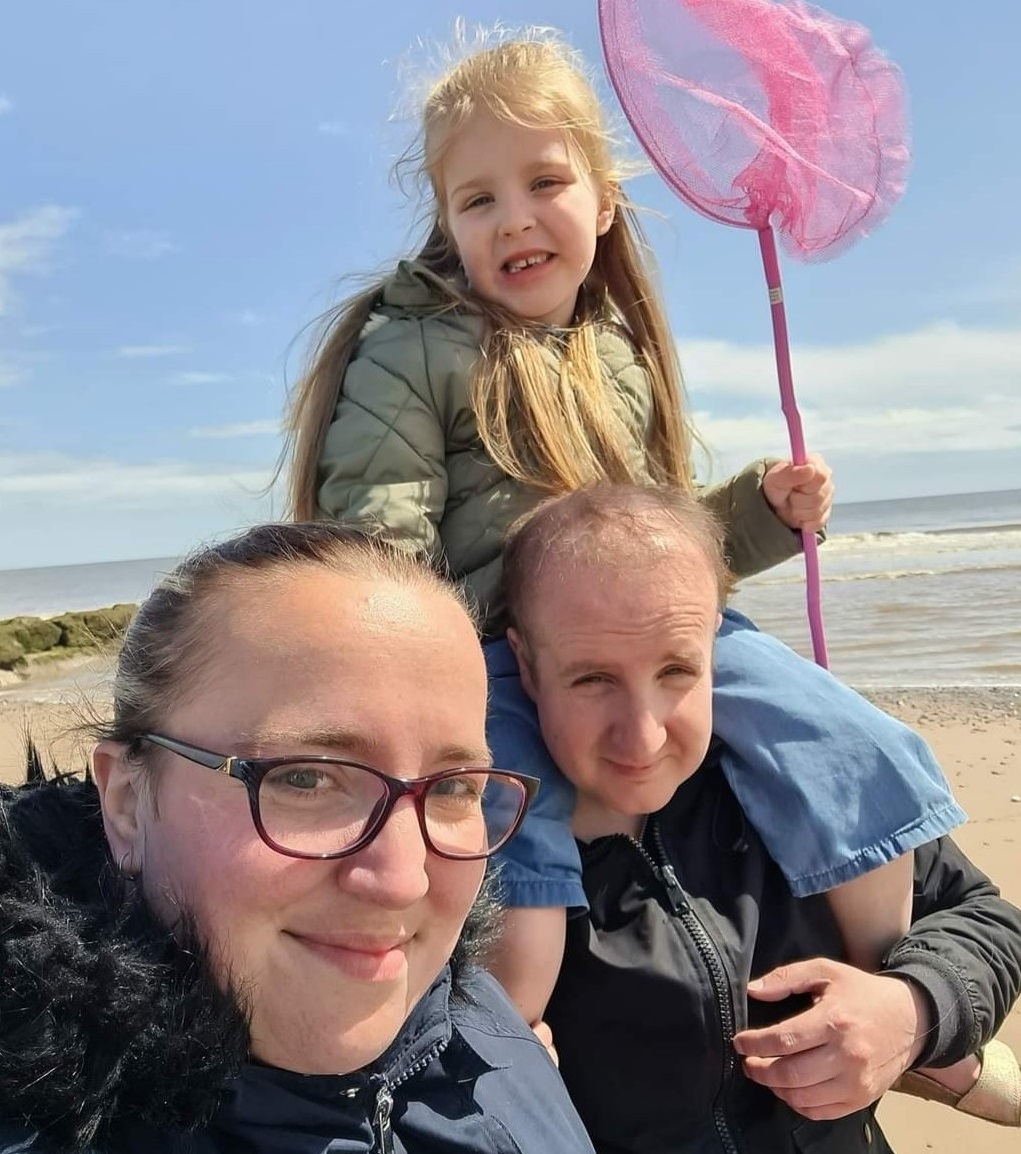Cornea recipient Shelley thanks her donor family for making an “incredible difference” to her life
Shelley Hague (33) immediately noticed the difference in her sight following a cornea transplant last year and started to pick up on small but vital details she couldn’t see before, like her six-year-old daughter’s eyelashes.
This World Sight Day (14 October), Shelley hopes that sharing her story will help to encourage more people to choose to donate their corneas when registering as an organ donor.
Shelley's story
In her late twenties, veterinary practice manager Shelley from Denton in Greater Manchester, was diagnosed with a rare condition called Posterior Polymorphous Corneal Dystrophy (PPCD) and high pressure in her right eye.
 These two conditions caused acute pain and water blisters in Shelley’s eye, whether open or closed, and affected her vision.
These two conditions caused acute pain and water blisters in Shelley’s eye, whether open or closed, and affected her vision.
Shelley tried to avoid situations where her eye would trouble her, including blustery or sunny weather, and stopped driving because she couldn’t fully trust her vision. Shelley also moved to front-of-house duties at work as her sight worsened.
In October 2019, Shelley was advised that a transplant would be the only solution to improve her vision and was placed on the waiting list. She was due to receive a cornea transplant in March 2020, but this had to be rescheduled to June, and then again to August.
The Covid-19 pandemic had an effect on the number of transplants taking place in 2020, as well as the number of donated corneas available for transplant.
Eventually Shelley underwent her right cornea transplant in November 2020, and within three weeks she was visiting a theme park to take her daughter on a Christmas train journey – something that wouldn’t have been possible pre-transplant.
 Shelley said: “Since the transplant I have been able start driving again and take on more of a rounded role at work. I’m looking forward to family holidays in our caravan on the coast in Fleetwood and trips to the beach, knowing that my eye won’t hinder my enjoyment of those experiences anymore.”
Shelley said: “Since the transplant I have been able start driving again and take on more of a rounded role at work. I’m looking forward to family holidays in our caravan on the coast in Fleetwood and trips to the beach, knowing that my eye won’t hinder my enjoyment of those experiences anymore.”
“Several of my family and friends have actually discussed cornea donation with me since my transplant. They said they weren’t really aware of the impact it could have on other people until they heard my story.”
Shelley has also written to her donor family, thanking them for making the decision to agree to donation and stating that the transplant has made an “incredible difference” and “changed my life”.
Shelley continued: “If someone was on the fence about cornea donation, I would say do it – you could change someone's life so incredibly. It can feel daunting, but you are doing something so valuable and irreplaceable.
“I am ever so grateful for my donor and his family. My corneal transplant has restored my sight and given me back my independence again.”
A shortage of donors
One in 10 people on the NHS Organ Donor Register have indicated that they do not wish to donate their corneas, making corneas the part of the body that most people say they do not wish to donate (1).
However previous research from NHS Blood and Transplant has shown that donation is more likely to be agreed if family or friends know what their relative wanted.
As of 11 October, there were 204 corneas in NHS Blood and Transplant’s eye banks – this number remains less than the 350 corneas needed at any one time to supply to hospitals and means longer waits for patients like Shelley to have their sight restored or their condition improved.
Kyle Bennett, Assistant Director for Tissue and Eye Services at NHS Blood and Transplant, said: “Cornea donation means there can be light after darkness. No one should have to go without being able to see their loved ones, which is why we are reminding people to consider giving the gift of sight.
“We understand that people often view the eyes with more emotion and see them as more symbolic than other parts of the body, but what greater gift can you give to someone than the ability to see the world around them, their loved ones faces and the independence which comes from being able to once again see things with their own eyes.
“There are less corneas in our eye bank than are needed for those waiting for a transplant, meaning people like Shelley are having to wait longer for a life enhancing procedure.
“If you agree to cornea donation, please help by sharing your decision with friends and family so they are better equipped to act for you should that day ever come.”
NHSBT’s Transplant Activity Report for 2020/21 states that 3,478 corneas were donated between April 2020 to April 2021, a 35% decrease on the previous year (2). This was during the height of the coronavirus pandemic and highlights that donations continued despite the unprecedented challenges faced across the NHS (3).
Dr Dale Gardiner, National Clinical Lead for Organ Donation and Transplantation at NHS Blood and Transplant said: “With a great team effort across the NHS, deceased organ donation and transplant activity continued for the most urgent patients during the first and second waves of COVID-19 and we have now returned to pre-COVID levels with all transplant centres reopening and once again, performing lifesaving transplants to patients most in need.
“During the height of the pandemic we saw incredible family support for organ donation with record numbers of families agreeing to donation and providing those waiting with life-saving organ transplants. This is testament to the strong foundation of altruism, and support for donation, across the UK.
“We hope to see this continue, particularly now the law around organ donation has changed in England and Scotland and the NHS continues on the road to recovery.”
About our campaign
NHS Blood and Transplant are running another Twitter campaign for World Sight Day this year to help raise awareness of the ongoing need for cornea donors, encouraging people, brands, and organisations to virtually donate the ‘i’ from their Twitter profile name and logo (4).
Get the facts about cornea donation and make sure you have told those closest to you your organ and tissue donation decision so that they know to honour what you would like to happen.
Article notes
- The NHSBT Transplant Activity Report 2020/21 states that as of 31 March 2021, 10.0% of people who joined the organ donation register chose not to donate their corneas. Page 142, Table 12.3.
- 5,323 corneas were donated between April 2019 and April 2020 (pre-pandemic). Page 106, Figure 10.1 in the NHSBT Transplant Activity Report 2020/21.
- NHSBT understands that this is a worrying time for those awaiting or having an organ transplant. The safety of organ donation and transplantation is our priority. We are working to continue organ donation where possible, to enable transplants to go ahead, if appropriate. Every potential organ donor is being tested for coronavirus and if someone has coronavirus, they will not be able to donate. There is no known transmission of coronavirus through organ donation in the UK. However, as patients who need a transplant have to be immunosuppressed, any risks need to be minimised as much as possible. Latest Covid-19 updates and FAQ.
- Get involved with the #IDonation Twitter campaign by removing any ‘i’s from your profile name (not the username beginning with @) by clicking on ‘Edit profile’ and amending the ‘Name’ field. Those with no ‘i’s in their name are encouraged to replace ‘o’s with the eye emoji 👁️. Use the #idonation hashtag.

